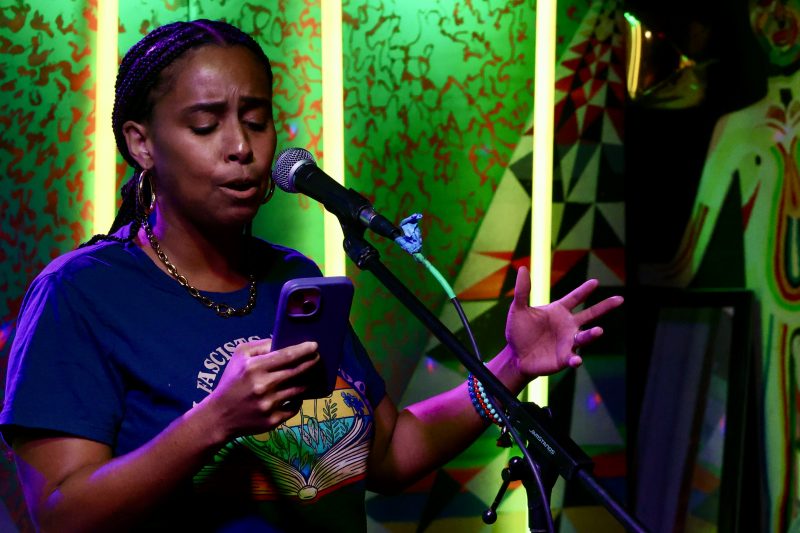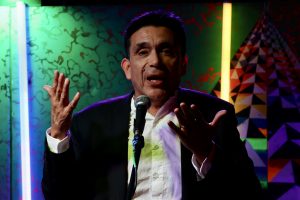As a New Texas Law Clamps Down on School Libraries, ‘Librotraficantes’ Fight Back
By Isabel Neumann
Photography By Isabel Neumann
Reporting Texas

Author Jasminne Mendez reads her poetry during the Banned Book Bash. Isabel Neumann/Reporting Texas
Just two months after a new Texas law expanded parents’ power to challenge school library books, authors gathered at the Texas Book Festival’s Banned Book Bash to read from titles that have been banned or challenged, or which might face future restrictions.
The festival’s Librotraficantes: Banned Book Bash, held Saturday at Cheer Up Charlies, brought together authors with firsthand experiences navigating book bans, challenges and what was described as a rising climate of censorship.
“At the end of the day we have to support underground libraries to make sure these voices are heard,” said Tony Diaz, a Houston-based writer, professor, media personality and longtime activist for ethnic studies. “We are experts at fighting book bans and the fact that we still have to be doing this tells you exactly what kind of movement we’re in.”
The Librotraficantes movement began in 2012, when Diaz organized a caravan to bring banned books back into classrooms in Arizona after the state eliminated Mexican American studies programs.
“We organized a six-city caravan, taking books that were prohibited from Houston all the way to Tucson,” Diaz told the book festival crowd. “We supported the students who overturned that racist law.”

Tony Diaz, founder of the Librotraficantes movement, hosts the Banned Book Bash at Cheer Up Charlies. Isabel Neumann/Reporting Texas
One of the featured writers Saturday was Ivan Gerardo Morales, author of “detained,” a memoir based on the notebook of a 13-year-old boy held in a Texas detention facility. The book’s focus on immigration enforcement and child detention has made it the kind of title that advocates say is increasingly vulnerable in Texas schools, where books that deal with race, political identity, and immigration are being removed.
“We’re here to uplift every immigrant and every voice because representation truly matters,” Morales said. “The more we know, the more we can uncover, the more we can unite, the more we can make positive change.”
Jasminne Mendez, a Dominican American writer and award-winning poet whose work commonly centers Afro-Latina identity, said her new young adult novel, “The Story of My Anger,” has not been formally banned, but she says it has become increasingly difficult to get the book onto school shelves — which she called soft censorship.
“If you look at the history of any sort of oppressive societies and dictatorship movements, book banning is a precursor to a much less free society and world,” Mendez said.
Mendez’s book follows a young Afro-Latina teen fighting book bans on her high school campus. Diaz said Mendez’s work represents “the next chapter” of the struggle.
“Her book updated that fight and places it in the suburbs of Houston,” he said. “I know for a fact that Barnes & Noble doesn’t have it on every shelf because they’re scared.”
Zeke Peña, a New Mexico-born, El Paso-raised illustrator known for “Mi Papi Has a Motorcycle,” a Pura Belpré Honor Book, shared his perspective on the importance of creating stories for young readers that reflect Mexican American life and borderland communities. This form of representation, he said, is increasingly important as books by authors of color face scrutiny.
According to PEN America, Texas recorded 538 instances of book bans in 12 school districts during the 2023-24 school year.
Sabrina Baeta, program manager for PEN America’s Freedom to Read initiative, told Reporting Texas that the increase is tied in part to a broader national climate of censorship.
“It’s actually very murky to be able to track some of these bans, specifically as they relate to legislation, but legislation seems to be increasing the threat of censorship across the country,” Baeta said. “And yes, in Texas, it’s creating environments of book banning.”
Baeta said that the books most often targeted include issues of race, racism, characters of color, LGBTQ+ identities and or contain sexual content or depictions of violence or abuse.
“Students often tell us they feel targeted and attacked because the books being banned reflect their identities and communities,” she said. “They want access to this information. For teachers and librarians, this disregards all of their expertise.”
The new Texas law that places restrictions on school libraries, Senate Bill 13, took effect on Sept. 1. The law expands parental veto authority over what students can get access to, requires districts to notify parents when a book is checked out and has led to a more formalized process for challenging or removing books. Critics warn that laws like SB 13 functionally increase censorship and may further limit students’ access to diverse books and materials.
Diaz said that’s why Librotraficantes continues to maintain what he called “underground libraries,” community spaces where challenged and banned books can continue to be in circulation.
“Teachers and librarians are scared to get fired,” he said. “So we make sure these books are still accessible. Some of our book smugglers can’t tell you who they are, but they’re out there.”